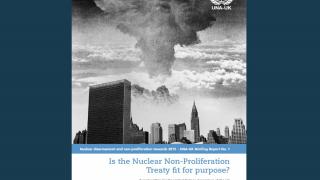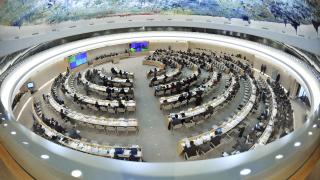
1 August 2011
UNA-UK's first Towards Zero briefing paper, written by Professor John Simpson, examines whether the Nuclear Non-Proliferation Treaty (NPT) is fit for purpose.
Since coming into force in 1970, the NPT has been the cornerstone of the international nuclear non-proliferation regime. It addresses three key issues: nuclear disarmament, nuclear non-proliferation and the promotion of peaceful uses of nuclear energy. However, many have argued that the viability of the NPT is increasingly threatened by a changing international context and a lack of political will to adapt to that change. It has therefore been suggested that the 2010 review was not a success, but rather a postponement of failure. In this report, Professor Simpson assesses the validity of such claims.
The report begins with a brief outline of the NPT’s history, before addressing the issue of political will. Professor Simpson asserts that those states which are party to the NPT have failed to demonstrate real commitment to a robust disarmament and non-proliferation regime. He argues that states have not taken adequate steps to:
Facilitate disarmament and non-proliferation among the five nuclear-weapon states
Prevent proliferation among non-signatories
Ensure that signatories (notably Iran) meet their obligations
The lack of political will is compounded by problems in interpreting and implementing the NPT. Furthermore, Professor Simpson notes that the geopolitical climate has changed significantly since the NPT came into force, leading to claims that its mechanisms are no longer fit for purpose. The end of the Cold War has increased the prevalence of regionalised security challenges, while the shift of economic power out of the Euro-Atlantic area has enabled emerging powers to force different ideas onto the international agenda.
Professor Simpson concludes by identifying a number of key priorities. These include setting clear targets for disarmament and nuclear security, and working towards a nuclear weapon-free zone in the Middle East.
About the author
Until 2008 Professor Simpson was founding Director of the Mountbatten Centre for International Studies at the University of Southampton and Professor of International Relations at that university. He is now one of its Emeritus Professors. In 1999 he was awarded an OBE for "services to nuclear non-proliferation".






